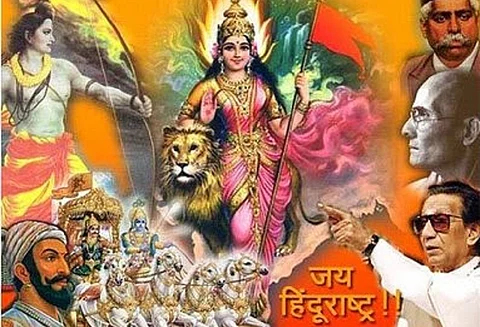

The Shiv Sena kicked up a storm on Thursday after its chief Uddhav Thackeray demanded that India should be declared a 'Hindu Rashtra'.
"They are speaking about laws banning beef in the country. They should first announce that this country is a Hindu Rashtra and impose the uniform civil code,” Thackeray said, at the party’s annual Dussehra rally at Mumbai Shivaji Park.
This came a day after the founder of the Hindu Sena, Vishnu Gupta, whose group was responsible for the ink attack on Jammu and Kashmir MLA Engineer Rashid, said his organization works on the agenda of establishing a 'Hindu Rashtra', and anyone who opposes it, would not be spared.
"The Hindu Sena, founded in 2011, works on the agenda of the establishment of a Hindu Rashtra in the nation, the construction of the Ram Mandir and the abolishment of Article 370, which gives special status to Jammu and Kashmir etc," Vishnu Gupta told ANI.
What exactly is a Hindu Rashtra?
In ‘Contours of Hindu Rashtra’, Ram Punyani writes that Vinayak Damodar Savarkar articulated the phrase “Hindu Rashtra”. Savarkar puts forward the theory that religions are the foundation of a nation and that India, going by its religious past and culture, is a Hindu Rashtra.
The demand for a Hindu nation has been around for many years now, and many outfits, chiefly the Rashtriya Swayamsevak Sangh and its chief Mohan Bhagwat, are leading the demand.
In a piece for the Deccan Chronicle, Aakar Patel tries to define the two words separately, to make sense of the RSS' demand.
Defining a nation as "a large aggregate of people united by common descent, history, culture or language, inhabiting a particular country or territory”, he goes on to suggest that one interpretation of the demand by the RSS could be that 'all Indians should all recognize that it is Hindu identity that is at the root of their cultural expression.'
He states,
That Islam and Christianity in India were also in some way an aspect of Hindustani culture and should be different from Islam and Christianity as they are practiced elsewhere in the world. When Hindu is used in the geographic sense, the RSS has support from many people, including some minorities who agree with its definition.
He also quotes Goa’s Deputy Chief Minister, Francis D’Souza of the BJP, saying, “India is a Hindu country — Hindu-stan. All Indians in Hindu-stan are Hindus, including me. I am a Christian Hindu, I am Hindustani.”
Another article by former RSS chief K.S. Sudarshan criticizes political leaders for considering the idea of a Hindu Rashtra as 'rank communalism' and a threat to secularism.
He defines a 'Hindu Rashtra' on similar lines.
Anyone who is a citizen of this country, irrespective of being a Shaiva, Shakta, Vaishnava, Sikh, Jain, Muslim, Christian, Parsi, Buddhist or Jew by way of his creed or mode of worship, is a Hindu.
Quoting Justice M.C. Chagla, he adds, "In true sense, we are all Hindus although we may practice different religions. I am a Hindu because I trace my ancestry to my Aryan forefathers and I cherish the philosophy and the culture which they handed down to successive generations. If only we accept this proposition and call ourselves Hindus by race, it would be the greatest triumph for secularism."
And if we accept this proposition, then it means that India is a Hindu Rashtra, implies Sudarshan.